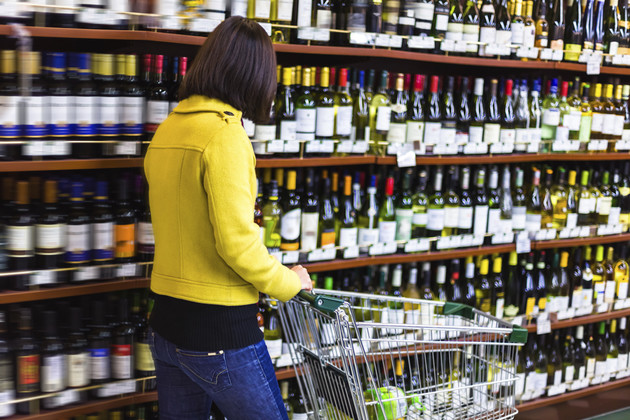Wines over £5 account for almost half of supermarket sales
The fastest-growing wines in UK supermarkets are those priced over £5 a bottle, which now account for 46% of the market, says the latest WSTA market report.
The data shows customers are moving towards more premium products as supermarket wine sales drop 3% in the last 12 months by volume, and 4% in the 12 weeks to April 26. In the same time, value grew by 2%.
Meanwhile, bars and restaurants had flat sales over the course of the past year, but business picked up in the 12 weeks to April 19, with wine up 3% on a like-for-like basis and imported whiskey up 9%.
 Supermarket wineThe fastest-growing wines in UK supermarkets are those priced over £5 a bottle, which now account for 46% of the market, says the latest WSTA market report.
Supermarket wineThe fastest-growing wines in UK supermarkets are those priced over £5 a bottle, which now account for 46% of the market, says the latest WSTA market report.
Sparkling wine remains the industry's success story, with sales up 20% in the on-trade and 14% in the off-trade in the last 12 weeks.
Drilling down into the data, and off-trade sales of South African and Argentinian wine continue to grow, up 14% and 21% respectively over the past 12 months. Many other countries are in double-digit decline, notably New Zealand (-15%), Italy (-11%) and Spain (-10%). New Zealand's decline could be linked to its increasing prices - they grew 11% to £7.27 in the past 12 months, while in the 12 weeks to April 26 reached £7.47 making it the most expensive wine in the off-trade by some way.
Wines and spirits now make up 41.45% of the value of all drinks sold in pubs, bars and restaurants, says the report. What's more old world wines are stealing a march on their new world counterparts French and Italian reds and rosés grow, alongside French and Spanish white wine. Australia (-9%), USA (-11%), Chile (-11%), Argentina (-9%), New Zealand (-20%) and Germany (-22%) all declined in the past 12 months.
Key off-trade findings
- Wine sales fell by -4% in the last 12 weeks and -3% in the last 12 months, although value was up +2% for the year.
- Spirits sales declined by -1% in the last 12 months with strong growth in imported whiskey (+9%) offset by a fall in sales of blended whisky (-3%).
- Sales of gin and vodka grew by +1% and +3% in the latest 12 weeks, primarily due to an increase in premium offerings.
- Sparkling wine was the only category to experience double digit growth in both the short (+20%) and long-term (+10%) at the expense of a decline in Champagne sales.
- The fastest-growing wines are those priced over £5 per bottle, which now account for 46% of the market.
Key on- trade findings
- Wine and spirit sales remained flat over the year, while beer sales fell by -5%.
- Sparkling wine enjoyed the largest category growth in the off-trade, up +14% in the short-term and +13% in the latest 12 months, the sixth consecutive quarter of growth.
- Sales of malt whisky also enjoyed strong growth, up by +20% in the last 12 months. In the short-term, sales of rum grew by +6% and gin by +4%, however sales of vodka, blended scotch and liqueurs all declined as like-for-like spirits sales fell by -2% in the last 12 weeks.
- Sales of red wine grew by +4% in the last 12 months and 3% in the last 12 weeks.
WSTA chief executive Miles Beale said: "Despite stagnant sales volumes, members - and the trade in general - will be buoyed by signs of improving consumer confidence. The growth of sparkling wine shows no sign of abating, while imported whiskey is emerging as a stand-out spirits performer."
The WSTA's market report draws on data from Nielsen, CGA Strategy and the Wilson Drinks Report. The figures represented here were collated too soon to measure the impact of the decision to scrap the duty escalator in the March 19 Budget.
Keywords:
- wine
- News
- France
- Argentina
- Retailers
- Chile
- Spain
- Wine & Spirit Trade Association
- Sparkling wines
- Gemma McKenna
- HWS - Gemma McKenna





